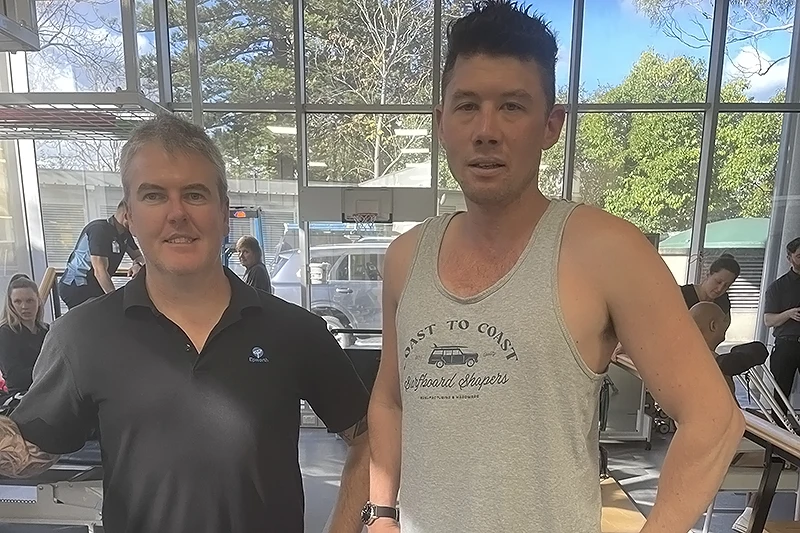Tenacious, persistent, furiously determined is the best way to describe the recovery efforts of Epworth outpatient Shane Harris. Despite being badly injured in a car accident almost 20 years ago, Shane continues with his rehabilitation. A novel therapy approach at Epworth Hawthorn is showing promising results.
Under the guidance of exercise physiologist Adrian Sexton, Shane is undertaking Blood Flow Restriction Training (BFRT). A cuff, similar to a blood pressure cuff, is attached to his leg to restrict blood flow while Shane does low-load resistance training. The goal is to tackle muscle atrophy and enhance strength responses in the muscles.
“When you starve the muscle of oxygen, the muscle fibres that you would normally use for high intensity exercises like sprinting or power lifting are engaged. With the blood flow restricted, patients can do basic exercises and have a similar strength response to higher load activity,” Adrian explained.
“This is great for patients who cannot tolerate high intensity exercises.”
This therapy, which is increasingly being used for strength and conditioning, both by athletes and in rehabilitation settings following injury or surgery, was introduced at Epworth three years ago.
Shane says he has tried everything to regain his strength following a life-threatening car accident in 2006 that resulted in a traumatic brain injury and fractures to his skull, neck and collar bone.
“I was 20, a young dude being crazy, driving 150km and landed on my head. I was put in an induced coma and part of my skull was removed due to swelling,” Shane said.
“When I was at Epworth Richmond, my parents were told I wasn’t expected to walk or talk.”
While Shane has regained mobility, he is a long way from his former self who played football, surfed and rode road bikes.
“It’s been a lot of hard work to get to this point. This is my 19th year of rehab. My drive comes from trying to fix my stuff-ups. All of these problems were caused by me. I was very active; to lose all of that at 20 sucks.
“At the moment I can’t do what I want, so I keep pushing. My strength is lacking and so is my endurance.
“I fall over quite regularly. Anything over 1km and I start to fatigue and collapse. My legs just drop out from under me.”
Adrian says the problems seem to be neurological.
“The nature of a brain injury means the brain loses the capacity to send messages across the nervous system effectively to the muscles affecting function,” Adrian explained.
For the next three months, Shane will do BFRT twice a week.
“When we first started working with Shane, we saw his strength plateau with more traditional therapies, then we tried BFRT and saw a big jump,” Adrian said.
His initial results show an impressive improvement in leg strength, with a 200% improvement in calf strength on the left side and 250% increase on the right, leading to significant improvements in Shane’s mobility.
“We’re continuing to boost his level of functioning, get stronger and improve his mobility,” Adrian added.
“We have had about 50 patients go through Epworth using this therapy so far. It’s proving quite successful.”




